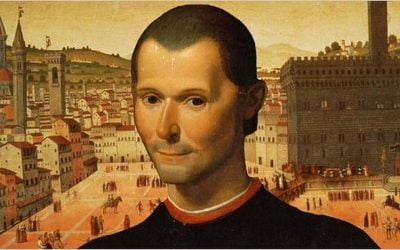Neoconservatives, Machiavelli and The Prince

Tyrants and despots have never required justification for their actions. In the 17th century, as political philosophers began to reject the classic Catholic doctrines of politics and ethics, The Prince was viewed as more relevant: truths are more important than ideals.
It is probably not an accident that The Prince has been misinterpreted for 300 years. Taken literally, there is no better justification for tyranny, whether political or economic, than the universal misinterpretation of The Prince by Niccolo Machiavelli. This small pamphlet, written in 1513–1514, addressed to the new Medici prince, if taken literally, outlines the best practices to attain and maintain power by using cruelty, fear, lies, deceptions, and the appearance of benevolence to hide the immoral actions required to achieve one’s goals. It names Caesar Borgia as the ideal prince to emulate.
The misunderstood, literal translation of The Prince has been used by philosophers, politicians, dictators, academics and business leaders for hundreds of years as a justification for acquiring and extending power using any immoral, unethical, and illegal means. In a word, it is the doctrine that the end justifies the means—that doing whatever is necessary in order to secure the glory of your country or company is justified.

The literal interpretation of The Prince has crystallized into a permanent political theory, a work that fits any age and will continue to fit any so long as it is not exposed as a fraud.
This misinterpreted pamphlet is loved because it emancipated politics from theology and moral philosophy. In so doing, it created a justification for specious behavior in practically every field of human endeavor. Millions of men and women have been duped into believing “the ends justify the means” and have blindly followed this “modern political philosophy” and its immoral, unethical and illegal principles like a Bible.
The Prince contradicts everything else Machiavelli ever wrote and everything we know about his life, his other books and writings. Based on his positions in government and his lasting friendships, Machiavelli was whole-heartedly a defender of the Republic of Florence. This contradiction and the knowledge of Machiavelli’s opinions provide evidence that most probably The Prince is a satire.
Philosophers such as Jean-Jacques Rousseau, Diderot and Sir Francis Bacon interpreted The Prince as a satire to warn the citizens of Florence about the tactics to expect from their newly installed Medici prince. U. S. Founding Father John Adams viewed Machiavelli as a defender of mixed government.
The neoconservative political movement has deliberately misinterpreted, misquoted, twisted and subverted Machiavelli’s books and in particular,The Prince, to accomplish their political goals.
The neoconservative political movement owes its genesis to Irving Kristol (1920–2009) a journalist, columnist, and writer who is dubbed the “godfather of neo-conservatism.” Irving Kristol took Leo Strauss, PhD (1899–1973) a twentieth-century philosopher, as his philosophical master. “From Strauss’s Persecution and the Art of Writing (1952), Kristol absorbed the message that philosophers needed to conceal their dangerous doctrines from the masses. . . . Philosophers form an intellectual elite, and they rank far superior to those lacking their wisdom.”[i] Kristol also developed a fascination for Machiavelli as did Strauss. Kristol penned the article “Machiavelli: Men and Ideas,” which ran in Encounter, the December 1954 issue. http://www.unz.org/Pub/Encounter-1954dec-00047
In the article, he calls Machiavelli “master,” but “what he had to teach is far from clear.” Essentially, Kristol treats Machiavelli as a philosopher who needed to conceal his “dangerous doctrines” from the masses. Kristol claims that Machiavelli’s irony and satire were techniques to conceal Machiavelli’s “new element in political thinking.” Quite the opposite is true. Machiavelli wrote The Prince to warn the citizens of Florence about the tactics to expect from their newly installed dictator.
 Kristol also writes of Machiavelli’s “hero worship” of Caesar Borgia (the model of an ideal prince). In fact, choosing Cesare Borgia (1475/76–1507) as a “model prince” to emulate can only be seen as satirical. A Medici prince, was being advised to emulate Caesar Borgia, a foreigner, a Spaniard, a bastard, convicted, in the court of public opinion of fratricide, incest, and a long rote of abominable crimes, a man specially hated in Tuscany for treachery and extortion and for the gross misconduct of his troops on neutral Florentine soil, and a man, to boot, who as a prince had been a notorious and spectacular failure. Machiavelli made his distaste for Borgia very clear in many works.
Kristol also writes of Machiavelli’s “hero worship” of Caesar Borgia (the model of an ideal prince). In fact, choosing Cesare Borgia (1475/76–1507) as a “model prince” to emulate can only be seen as satirical. A Medici prince, was being advised to emulate Caesar Borgia, a foreigner, a Spaniard, a bastard, convicted, in the court of public opinion of fratricide, incest, and a long rote of abominable crimes, a man specially hated in Tuscany for treachery and extortion and for the gross misconduct of his troops on neutral Florentine soil, and a man, to boot, who as a prince had been a notorious and spectacular failure. Machiavelli made his distaste for Borgia very clear in many works.
In justifying Machiavelli’s The Prince as “political science” as opposed to rhetoric in the form of satire, Kristol quotes Machiavelli:
“It is a sound maxim that reprehensible actions may be justified by their effects”.
Kristol continues:
“It is nonsensical to say that reprehensible actions are to be justified by their affects, for if they are so justified, they are not “reprehensible”.
This short statement evolved to “the ends justify the means” and summarizes how the literal interpretation of The Prince, a satire, has crystallized into a permanent political theory. It has become the justification for any action whether immoral, unethical, or illegal.
Leo Strauss (1899–1973) was a twentieth-century philosopher who was born in Germany and received his PhD from the University of Hamburg.
In 1937, Strauss moved to the United States. Following a brief fellowship at Columbia University, he held a position at the New School for Social Research from 1938 to 1948. . . . In 1949, Strauss received a professorship at the University of Chicago. The publication of Natural Right and History (1953) brought lasting renown along with intense controversy.<http://contemporarythinkers.org/leo-strauss/biography/>.
His first extensive studies of Plato and Machiavelli were printed in the mid-1940s. Strauss went on to write fifteen books, including Thoughts on Machiavelli. In 1958, Leo Strauss wrote:
Machiavelli is the only political thinker whose name has come into common use for designating a kind of politics, which exists and will continue to exist independently of his influence, a politics guided exclusively by considerations of expediency, which uses all means, fair or foul, iron or poison, for achieving its ends—its end being the aggrandizement of one’s country or fatherland—but also using the fatherland in the service of the self-aggrandizement of the politician or statesman or one’s party.[ii]
Among the other admirers and students of Leo Strauss was Paul Wolfowitz, who served as U.S. Deputy Secretary of Defense for policy from 1989 to 1993 during the administration of George H. W. Bush. Defense Planning Guidance, a document prepared during 1992 by Paul Wolfowitz, is regarded by manyas the “quintessential statement of neoconservative thought.”
C. Bradley Thompson, PhD, coauthor of Neoconservatism: An Obituary for an Idea: argues that neoconservatism’s key philosophical inspiration comes from Irving Kristol, and particularly from Kristol’s engagement with the philosopher Leo Strauss.
In a December 6, 2010, interview with Scott Horton, published in Harper’s,
https://harpers.org/blog/2010/12/the-death-of-neoconservatism-six-questions-for-c-bradley-thompson/,
Thompson argues that under Straussian influence, neoconservatives champion the rule of a philosophically cunning elite over a population that will never be able to understand their intellectual masters. Instead, the populace is steered toward self-sacrifice, war, and nationalism—as well as a set of religious and moral beliefs that the elites in no way share. Such a doctrine, Thompson charges, points disturbingly toward fascism.
The neocons’ “philosophy of governance” is a technique that teaches rulers or potential rulers how to think about politics rather than what to think. It’s about developing pragmatic tactics for getting, keeping, and using power in certain ways. It’s about knowing how to improvise, modify, and adapt one’s principles to changing circumstances. Machiavellian prudence must always trump principle.
In his article “Neoconservatism Unmasked,”
<http://www.cato-unbound.org/2011/03/07/c-bradley-thompson/neoconservatism-unmasked>.
Thompson says:
The neocons’ national-greatness philosophy is also the animating force behind their foreign policy. Indeed, neoconservative foreign policy is a branch of its domestic policy. The grand purpose of national-greatness foreign policy is to inspire the American people to transcend their vulgar, infantilized, and selfish interests for uplifting national projects. The neoconservatives’ policy of benevolent hegemony will, according to William Kristol and Robert Kagan, “relish the opportunity for national engagement, embrace the possibility of national greatness, and restore a sense of the heroic.” In other words, the United States should wage war in order to combat creeping nihilism. In the revealing words of Kristol and Kagan, “The remoralization of America at home ultimately requires the remoralization of American foreign policy.” Going to war, sacrificing both treasure and blood in order to bring “democracy” to strangers—this is a mission worthy of a great nation.
The neocons therefore believe that a muscular foreign policy—one that includes military intervention abroad, war, regime change, and imperial governance—will keep the American people politicized and therefore virtuous. By saving the world from tyranny, America will save herself from her own internal corruption. And there’s more. By keeping America perpetually involved in nation-building around the world, neoconservative rulers will have the opportunity to exercise their statesmanlike virtues. There can be no statesmanship without politics and there can be no truly magnanimous statesmanship without war, so the neocons fear and loathe moral principles that might deny them this outlet. A condition of permanent war, a policy of benevolent hegemony, and the creation of a republican empire means that there will always be a need for politics and statesmanship.
Among the other admirers and students of Leo Strauss was Paul Wolfowitz, who served as U.S. Deputy Secretary of Defense for policy from 1989 to 1993 during the administration of George H. W. Bush. Defense Planning Guidance, a document prepared during 1992 by Paul Wolfowitz, is regarded by manyas the “quintessential statement of neoconservative thought.”
Our first objective is to prevent the re-emergence of a new rival, either on the territory of the former Soviet Union or elsewhere that poses a threat on the order of that posed formerly by the Soviet Union. This is a dominant consideration underlying the new regional defense strategy and requires that we endeavor to prevent any hostile power from dominating a region whose resources would, under consolidated control, be sufficient to generate global power.<http://www.pbs.org/wgbh/pages/frontline/shows/iraq/etc/wolf.html>.
Many historians today are seeking to redeem the reputation of Niccolo Machiavelli. They are experts in linguistics, Renaissance rhetorical genres and politics.
Francesca de Bardin has studied geo-politics and the global impact of colonialism and globalization for 25 years. Her conclusion is that many key masculine values that have advanced our civilization have now become harmful. The planet is out of balance and women’s values must be incorporated into our organizational structures worldwide. She writes and speaks about feminine values and leadership. For an article analyzing Machiavelli’s life and work, contact the author at: [email protected].
Sources
[1] David Gordon, “Neoconservatism Taken Down” [Review of Neoconservatism: Obituary for an Idea]. MISIS Daily 16 Sept. 2011.
[2] Leo Strauss, “Niccolo Machiavelli,” History of Political Philosophy, 3d ed. (Chicago: University of Chicago Press, 1987), 297.


